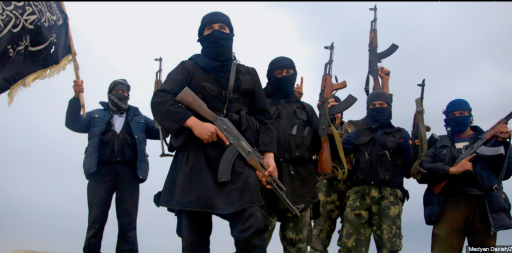What Is a Moderate Muslim, Part II
Robert Spencer adds substantially to my discussion of last week on What Is a Moderate Muslim?
[T]raditional Islam itself is not moderate or peaceful. It is the only major world religion with a developed doctrine and tradition of warfare against unbelievers. (Those who claim that Christianity is equivalent should read that sentence over carefully before invoking the Crusades.) The Qur’an and Sunnah teach warfare against unbelievers until they are converted or subjugated as dhimmis. See Qur’an 9:29 (bearing in mind the traditional Islamic theology that holds that sura 9, as the last revealed, takes precedence over other Qur’anic passages that appear to counsel tolerance rather than war), Sahih Muslim 4294, etc. etc.; I explain this at length with reference to Islamic texts in my books, including the latest, The Politically Incorrect Guide to Islam (and the Crusades). I have been harshly criticized for not going farther than this and denying that any peacefully-inclined Muslims even exist. Some have even claimed that such people are all deceivers, which I think is an impossible position to hold, as it claims a knowledge of other people’s hearts that no one really has. It also betrays a strange unawareness of the fact that a wide spectrum of belief and practice exists within all religious traditions.
As to Stephen Schwartz‘ TCS article that served as the launching point of my post, “There are some useful elements to his analysis, and some not so useful.” The problem is Schwartz’ assertion that it is Wahabbism, not Islam itself, that is the problem.
But is opposing Wahhabism enough to make one a moderate? After all, the Deobandis in Afghanistan are Hanafi Muslims, not Hanbalis like the Wahhabis — but they had no trouble making common cause in jihad with the Wahhabis. What’s more, the passages of the Qur’an and Hadith that jihadists invoke to justify their actions weren’t invented by the Wahhabis; they have always been there and were exploited by Muslims fighting violent jihads long before Muhammad Ibn Abd al-Wahhab was born.
After all, the primary difference between Wahhabi Islam and more traditional variants of the religion is not jihad warfare against unbelievers, but the Wahhabis’ practice of takfir, or the classification of Muslims of other sects as among those unbelievers. Schwartz accordingly eschews takfir: “Moderate Muslims may also be identified by what they do not do, to contrast them with radicals. And at the top of that list comes the practice of takfir, or declaring Muslims unbelievers over differences of opinion. Takfir also includes describing the ordinary, traditional Muslim majority in the world as having fallen into unbelief.†Very well, but what of jihad against non-Muslims? Schwartz says: “Islam is not, and never was, a radical or fundamentalist religion in its mainstream practice, regardless of the fantasies of Islamist fanatics and Islamophobes alike.†Maybe not, but I’d like to see him define “radical†and “fundamentalist.†Even the Ottoman Empire, of which he is fond, waged aggressive jihad against Christian Europe over a period of centuries. Not radical or fundamentalist? Pardon me if I am not reassured.
[…]
Schwartz concludes by saying that “moderate Muslims concentrate on devotion to their religion, not on politics or public relations…†Yet traditional Islam has never known a distinction between devotion to the religion and political action: the sacred/secular distinction is unknown in Islam. If Schwartz wants to import this distinction into Islam from the Judeo-Christian West, more power to him; but he will have little or no success persuading his fellow Muslims that his point of view on this and other matters is correct unless he confronts the uncomfortable questions about the Islamic texts that so far he has answered only with insults and haughty silence.
Rusty Shackleford adds,
Wahhabism is not the problem. Wahhabism is a problem, because it has state sponsors in Saudi Arabia and other Gulf states to spread its dogma. The problem then is main stream Islam–even moderate Islam.
Moderate is a meaningless term which can only be understood as relative to the society we are talking about. For instance, could a historian distinguish between moderate and extremist Nazis? A moderate Nazi might be said to be one who is thoroughly antisemetic, but who insists that the ‘Jewish question’ ought to be solved through forced segregation and laws against intermarriage. The word moderate, then, can be used to describe ideologies which only seem moderate when compared to a much more extremist alternative. If that moderate ideology were examined on its own terms it might very well seem extreme.If the only thing that differentiates moderate Muslims from extremists are a rejection of takfir and of terrorism, then truly the world is full of moderate Muslims. But is that enough?
I have a very simple way to determine if the form of Islam is acceptable to me: does it reject Sharia. That is it.
This strikes me as closer to answering the question than Schwartz’ piece. That “moderate” is a contextual term becomes obvious in how one applies it. In our own context, a Pat Robertson is rightly considered an extremist. Even he would not advocate an actual Christian theocracy.
The bottom line is that there are indeed moderate Muslims. They are not, however, nearly as common as Schwartz would have us believe.






“The bottom line is that there are indeed moderate Muslims.”
That begs the question, How Muslim are the moderates? Is the Pope correct in telling us the Quran is/cannot be open to any interpretation? In that case “moderate” Muslims are, like Rusty Shackleford hints, merely those who would treat non-Muslims less harshly. It’s not as if there aren’t hundreds of years of history to show us the way.
It’s as if Spencer thinks he can pick up the Qur’an, interpret a given verse the way he thinks it reads on the page, and infer what “all Muslims” are supposed to believe.
Good luck trying that with the Bible, folks.
Spencer’s theory that 9:29 “abrogates” more tolerant verses is doubtless accepted by some Muslims, but certainly not by all. See this exegesis, for example.
(And what principle was Ann Coulter relying on when she urged that we should invade the Muslim nations in the Mideast, kill their leaders, & convert them to Christianity?)
In our own context, a Pat Robertson is rightly considered an extremist. Even he would not advocate an actual Christian theocracy.
I wouldn’t bet on that, James.